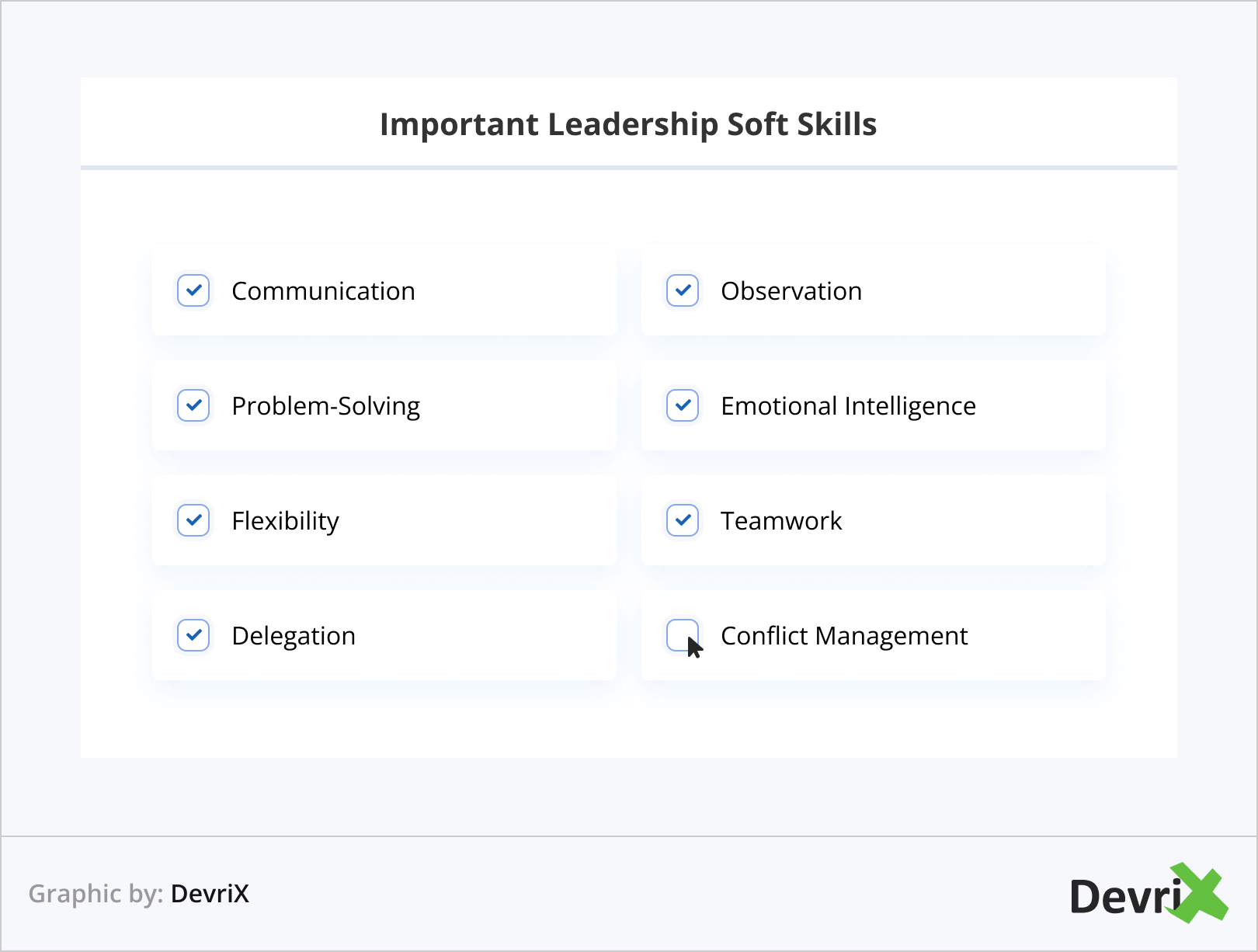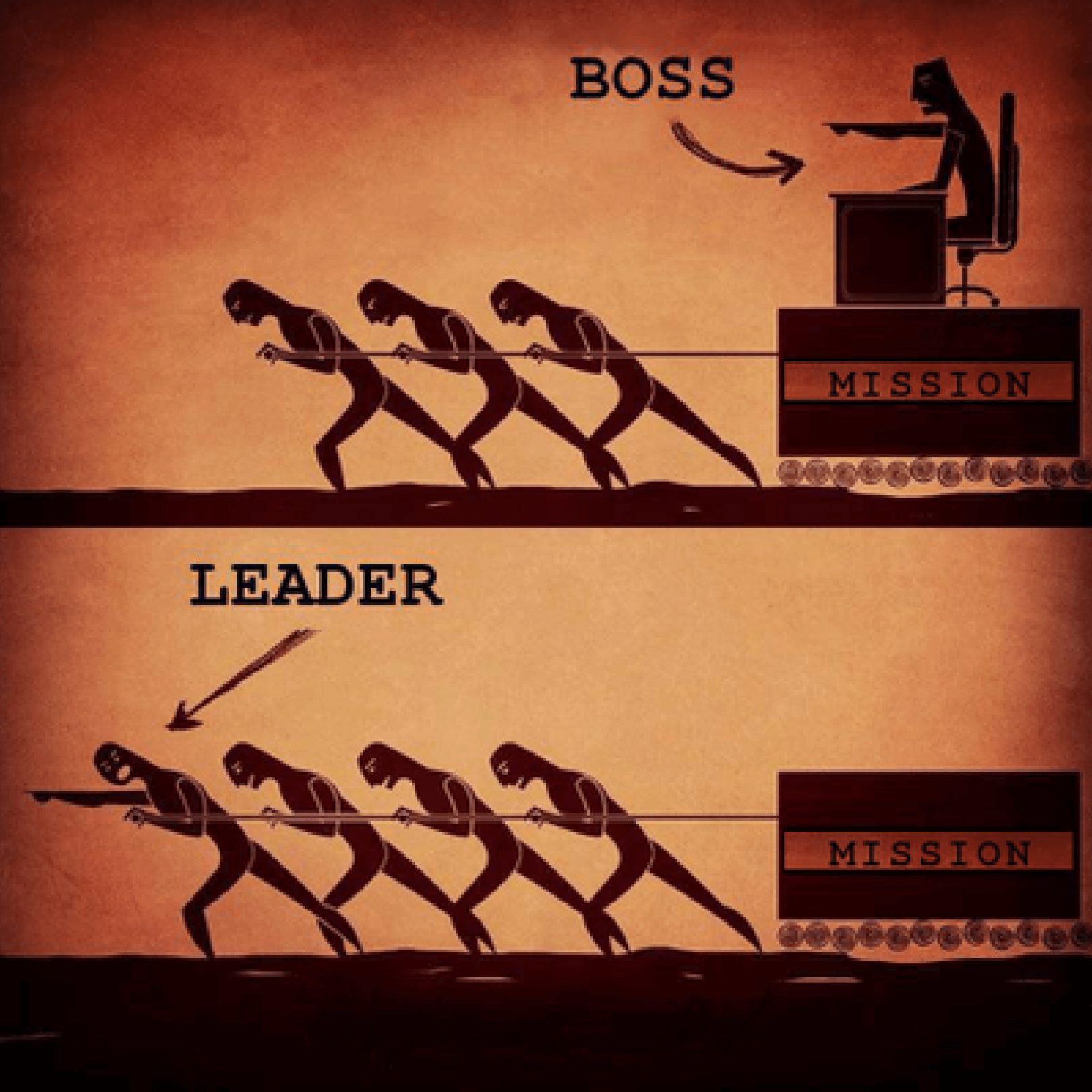In business, the leadership style that the company promotes defines the work culture, employee happiness, and company success.
As such, it’s an essential factor in turnover and employer branding.
The Great Resignation is a force to be reckoned with, and businesses around the world struggle with a wave of people leaving for good.
In fact, a recent study found that 62% of people leave their jobs because of toxic work culture, and 56% because of poor management.
Faced with this new workforce order, to attract and retain talent, business owners and managers are forced to rethink their approach and polish their leadership soft skills.
In this article, we’ll be talking about the importance of soft skills in business relationships and highlight 8 of the most essential leadership soft skills.
Read on!
What Are Soft Skills?

Soft skills are a set of individual qualities that apply to workplace communication and personal and professional interactions. They define the way a person handles themselves in different circumstances, how they treat others, and how they manage their relationships with clients and coworkers.
In business, “soft” skills as opposed to “hard” skills are the ones that pertain to personality, mindset, and attitudes versus the ability of the person to implement the job that they were hired to do.skills.
Simply put:
hard skills vs. soft skills = expertise vs. human factors
Is Leadership a Soft Skill?
Leadership is often referred to as a type of soft skill.
However, as there are different types of leadership that entail entirely different approaches and communication styles, it’s more accurate to say that leadership is more of a combination of soft skills, rather than a soft skill itself.
Why Are Soft Skills Important for Leaders?

Leaders set the tone and pace of workplace communication. How they manage their colleagues and subordinates, treat their clients, and approach difficult situations reflects on those around them.
For example, if a manager promotes a competitive environment, employees are less likely to work in a team and collaborate with each other. In fact, they are more likely to focus on their own achievements and try to stand out.
However, if managers encourage employees to collaborate and help each other out, people will align their own skills with those of others and work together towards a common goal.
Or, if leaders fail to listen to employees and respond to their needs, people are likely to lose their motivation. This may reflect on their productivity, and even drive them to leave.
But if they listen and pay attention, they are more likely to notice the discontent of their employees, find ways to make their work experiences more satisfying, and therefore, retain them.
In a nutshell, leadership soft skills are all about doing your job with grace, and showing employees the respect, appreciation, and validation they are due.
Managing to do this can result in a better work culture and a team that’s more productive, motivated, loyal to the company, and dedicated to their jobs.
Important Soft Skills for Leaders
Regardless of whether you are in higher management, run a small team, or just mentor a colleague, the following essential leadership soft skills will help you do a better job:

1. Communication
Promoting a work culture based on communication is one of the foundations of business success.
Leaders should always be open to engaging with others. They need to show employees that they are ready to hear what they have to say, relate to their points of view, and respond to their needs.
As a result, management not only provides advice, and solutions to problems, but it also identifies growth opportunities and finds the best way to utilize the talents of their employees, so that both the employees as well as the company benefit.
In a communication-centric work environment, people are less likely to misunderstand their duties, delay task completion, and/or struggle to do their job properly.
Furthermore, when employees feel understood and appreciated, know what they are supposed to do, and can count on support from others, this boosts their confidence, motivation, and productivity.
It’s up to the leader to introduce this type of dynamic to the group, and oversee that others follow it.
2. Observation
The leader should pay attention to how others in the group behave, interact, and work.
This way, they notice when there are issues with employees and their performance at work.
Observational skills, combined with good communication and attention to detail can provide a keen insight into situations in the workplace. And leaders can leverage this information to mitigate conflict, prevent employees from losing motivation, and even reduce turnover.
The point is that the more time and effort you invest in observing how others behave, the better you are at understanding the reasons behind their actions, at noticing issues and finding solutions. And what’s more, you show people that you care. This allows you to build a stronger relationship with them.
As a result, they, too, care more and become more loyal and motivated.
3. Problem-Solving
When there are problems in the workplace, a leader needs to be able to find the right solutions quickly and with minimal fuss.
This includes data-driven decision-making, thinking and acting under pressure, and crisis management.

Regardless of whether there are problems between employees, in client communication, or with partners, the responsibility falls upon the leader.
And it’s not only about minimizing the damage and finding the best course of action.
The way leaders handle themselves in tough situations can set an example and inspire their teams to remain calm and do what needs to be done.
4. Emotional Intelligence
Emotional intelligence is a soft skill that people can benefit from in every aspect of their lives, and leadership is not an exception.
Understanding our own emotions and not letting them overwhelm us allows us to act rationally and stay focused in heated situations, as well as recognize and accept the feelings of others.
Furthermore, insight into the emotions of the people around us makes it easier for us to relate to what they are going through, and act accordingly.
When management show empathy, they build a stronger connection with their team, and this can make people feel understood and appreciated, and boost their morale.
5. Flexibility
Similar to life, in business, not everything goes according to plan all the time.
To be able to keep their team afloat in all circumstances, leaders have to be flexible and open-minded. They need to be able to rely on quick reactions, critical thinking, and creativity.
This way, they will have a chance to turn obstacles into opportunities moving forward.
In some cases, this may mean being ready to admit that you’ve been wrong, changing course, taking advantage of unexpected assets in a tough situation, redistributing responsibilities and priorities.
The role of the leader in a team is to make the tough decisions and by being flexible, they make it more likely to succeed.
6. Teamwork

Teamwork is essential for business success, and a strong leader needs to be a part of the team, rather than a stand-alone player.
When they lead by example, they inspire people to follow in their footsteps, stay motivated, and keep up the good work.
And this pays off – especially when there is a difficult task at hand that requires employees to go the extra mile and push their limits.
Furthermore, as the adage goes:
“People don’t leave bad jobs, they leave bad bosses.”
However, the opposite is true as well – even when given an opportunity to leave, people may stay because of a strong leader who they respect and value as a mentor and teammate.
7. Delegation
A smart leader knows that they can’t carry the world on their shoulders – not alone, anyway.
Despite the responsibility to increase efficiency and productivity, they have to be able to delegate tasks to team members.
After all, more often than not, this is why there are different people in a team – each has a role that contributes to the success of the group.
However, delegating may be easier said than done, especially when the person in charge feels the need to retain complete control over every aspect of the job.
By delegating tasks and distributing responsibility, the leader let their team know that they trust them. This inspires confidence, and encourages them to grow and take on responsibility.
However, keep in mind that delegating doesn’t mean that the leader should be disengaged. They still need to oversee processes, coordinate tasks, provide advice when necessary, and help their team when they need it.
8. Conflict Management
Conflict management and problem mitigation are vital leadership soft skills.
In the workplace, more often than not, there are people with different backgrounds and personalities under one roof. Each of them has a different approach and a different working style.
This may create conflicts that affect not only the atmosphere in the workplace and the way people feel, but also the quality of their work, their motivation, and productivity.
Good management should strive to prevent these types of issues, and serve as a mediator when they do happen.
By knowing each employee and their personality, you can approach the conflict properly and help people reach a compromise.
Simply put, you should help people in the workplace get along, and mediate when necessary.
Bottom Line
Developing your soft leadership skills can help you boost your own performance while improving the work of your team, thus benefiting your organization.
Soft skills are all about your attitude toward others, behavior in the workplace, and the way you handle yourself in different situations.
By acting with grace, empathy, and consideration, you not only build a strong relationship with your teammates, but you motivate them to care more about their work and stay productive.
The ultimate goal of soft skills is to make you a better leader and a better person.




